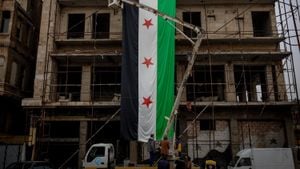The political situation in Georgia has taken another sharp turn as the United States prepares to implement new sanctions aimed at the government led by the ruling party, Georgian Dream. On December 16, Matthew Miller, the U.S. State Department spokesperson, expressed serious concerns about the state of democracy within the country at a press briefing. Noting actions taken by Georgian Dream to undermine democratic processes, Miller indicated the U.S. plans to take "further actions" soon, hinting at sanctions targeting those involved with the current political regime.
The backdrop for these impending sanctions is Georgia's recent controversial presidential election, where former professional football player Mikheil Kavelashvili was elected president by the electoral college amid widespread allegations of electoral malfeasance. Following the election result announcement, which proclaimed Kavelashvili as the winner with 54% support, protests erupted, fueled by accusations of voting irregularities and broader frustrations with the government’s drift away from European integration.
At the heart of U.S. actions is their response to legislative moves by the Georgian Dream party, which have been perceived as veering toward authoritarianism. Earlier this month, the U.S. government introduced visa restrictions on approximately twenty Georgian nationals connected to the current government, whom it accuses of undermining democratic principles. These individuals reportedly include parliament members, high-ranking officials, and law enforcement leaders, though their names have not been disclosed publicly.
The climate of concern is supported by deepening tensions within the European Union as well. According to discussions reported by Politico, Kaja Kallas, the head of the EU’s foreign service, is advocating for similar sanctions against the ruling party during her debut meeting with EU foreign ministers. While Baltic states such as Latvia, Lithuania, and Estonia have already implemented individual sanctions against some Georgian officials linked to human rights violations, opposition remains among other EU member states like Hungary and Slovakia, casting doubt on achieving consensus at the EU level.
This political discord is reflective of broader geopolitical tensions. Georgia's government has become increasingly labeled as pro-Russian, especially following statements by Prime Minister Irakli Kobakhidze announcing the postponement of European Union accession negotiations until 2028. This decision has not only spurred protests but has also prompted U.S. and EU officials to reassess their diplomatic relations with Tbilisi.
Friday saw the introduction of 20 new visa restrictions by the U.S., targeting figures believed to play pivotal roles in stifling dissent and fostering anti-democratic reforms. While specifics of the sanctions package remain under wraps, Miller's declaration of "further actions" signals to both the government of Georgia and the international community Washington's intent to hold political leaders accountable.
On December 14, the new president, Kavelashvili, was announced amid opposition claims, including those from current President Salome Zourabichvili, who boycotted the election and labeled it "a mockery of democracy." She accused the electoral process of failing to reflect the will of the people, emphasizing the importance of new elections to restore trust and legitimacy.
Protests against the government flared up following the controversial election, creating significant unrest as many citizens took to the streets, calling for accountability and justice. Kavalashvili’s ascent to the presidency is seen by many as emblematic of the dream’s control over Georgian political life. Opposition leaders, unyielding after the election results, have urged the European Union to not recognize the legitimacy of the government.
The situation took another twist when local authorities broke up protests using force, leading to widespread criticism. Reports of violence against peaceful protesters and journalists have heightened tensions, putting the spotlight on human rights issues within the country. Protesters have been calling for the reevaluation of Georgia’s foreign policy and have positioned their demands for reform as not just about democracy but about the nation's identity and alignment with Western ideals.
Simultaneously, the political crisis faces challenges from foreign relations, particularly with Russia, which has expressed its openness to normalizing ties with Georgia. The Russian government, distancing itself from responsibility for diplomatic ruptures following the war with Georgia back in 2008, has claimed it’s been Georgia’s actions, particularly under former president Mikheil Saakashvili, which severed relations.
Compounding Georgia’s international challenges, Kallas highlighted the EU's lack of consensus on sanctions concerning Georgia at the recent ministers meeting. While discussions are underway to impose restrictions on members of the Georgian government accused of rights abuses, momentum for these measures is currently stunted by opposing views among EU nations.
A key factor influencing this hesitant stance arises from fears of repercussions on innocent citizens rather than just officials. European ministers are reportedly pushing for actions, including limiting the visa-free regime for diplomatic passport holders from Georgia. The intent, as described by officials, is to target high-level officials directly linked to controversial policies without penalizing ordinary citizens.
Recent weeks have witnessed heightened discourse over potential EU sanctions targeting leaders such as Bidzina Ivanishvili, the party founder, and other key figures like Vakhang Gomelauri, the Minister of Internal Affairs. Baltic states, leading the charge for sanctions, have proceeded with individual restrictions against officials involved with repressing dissent.
With protests continuing and persistent calls for reform reverberate through Tbilisi, the international spotlight remains firmly fixed on Georgia. Many observers note the rising frustration among the populace who conflate their government’s actions with broader issues of human rights and national self-determination.
The legislative environment is also tumultuous, as accusations of overreach and control have emerged following controversial laws such as the "Transparency of Foreign Influences" law, which stirred public outcry. This law’s opponents argue it hampers non-governmental organizations and rights protections, seemingly aligning Georgian policies with Putin-era strategies.
On the ground, the struggle for the soul of Georgia rages, with persistent protests echoing calls for democratic integrity amid accusations of betrayal by those at the helm. The outcome of the standoff will significantly influence Georgia's future direction—whether it will embrace its aspirations for EU integration or drift back under Russia’s influence. The coming weeks, poised to see the implementation of new U.S. sanctions, may serve as both challenges and opportunities for change.



